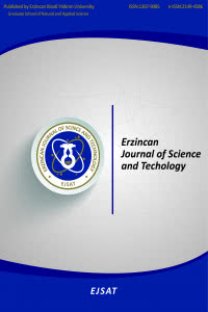Kanser Tedavi ve Teşhisinde Kullanılan I-131 Radyoizotopun Fisyon Bariyer Modelleri Kullanılarak Üretim Tesir Kesitlerinin İncelenmesi
Kanser hastalıklarının teşhis ve tedavisinde radyoizotopların kullanılması tıbbi radyolojide oldukça önemlidir. Radyoizotop üretiminde, reaksiyon veriminin yüksek ve üretim maliyetinin düşük olması istenmektedir. Bunları sağlamak için nükleer reaksiyonların teorik olarak önceden araştırılması gereklidir. Bu çalışmada, tiroid ve böbrek kanserinin teşhis ve tedavisinde kullanılan 131I’ nın farklı üretim yöntemleri araştırılmıştır.131I radyoizotopunun (p,f) reaksiyonları ile üretilmesi için muhtemel reaksiyonlar teorik olarak incelenmiştir. Teorik çalışmalar için TALYS bilgisayar kodu içerisinde yer alan fisyon bariyer modelleri kullanılmıştır. Her bir model hem birbirleri ile hem de EXFOR veri tabanından alınan deneysel veriler ile karşılaştırmalı analizleri yapılmıştır.
Anahtar Kelimeler:
Kanser tedavisi, 131I, radyoizotop, tesir kesiti, talys, exfor
Investigation of Production Cross-Sections by Fission Barrier Models of I-131 Radionuclide used in Cancer Treatment and Diagnosis
The use of radioisotopes in the diagnosis and treatment of cancer diseases is very important in medical radiology. In radioisotope production, it is desirable that the reaction efficiency is high and the production cost is low. In order to achieve these, it is necessary to investigate theoretically the nuclear reactions in advance. In this study, different production methods of 131I used in the diagnosis and treatment of thyroid and kidney cancer were investigated. The possible reactions for the production of 131I radioisotope by the (p, f) reactions were theoretically examined. For theoretical studies, fission barrier models in TALYS computer code were used. Each model was compared with each other and with the experimental data obtained from EXFOR database.
Keywords:
Cancer treatment, 131I, radioisotope, cross-section, Talys, Exfor,
___
- Büyükuslu, H., Kaplan, A., Tel, E., Yıldırım, G., Aydın, A., 2010, Production Cross Sections of Medical 110, 111In Radioisotopes, Kerntechnik 75 (3) 103-108.
- Capote, R., vd., 2009. RIPL – Reference Input Parameter Library for Calculation of Nuclear Reactions and Nuclear Data Evaluations. Nuclear Data Sheets 110. 3107–3214.
- Demir, B., Kaplan, A., Çapalı, V., Sarpün, İ. H., Aydın, A. and Tel, E., 2015, Production Cross–Section Calculations of Medical 32P, 117Sn, 153Sm and 186,188Re Radionuclides Used in Bone Pain Palliation Treatment, Kerntechnik 80 (1), 58-65.
- Gediklioğlu, A., 1988. Çekirdek Fiziğine Giriş. Karadeniz Teknik Üniversitesi Basımevi, Yayın No: 130, 220s. Trabzon.
- Gündoğdu E. A, Özgenç E., Ekinci M., Özdemir D., Aşıkoğlu M., 2018, Nükleer Tıpta Görüntüleme ve Tedavide Kullanılan Radyofarmasötikler, J. Lit. Pharm Sci., 7 (1) 24-34.
- Koning, A. J., Hilaire, S., Goriely S. 2018. “TALYS–1.9 A Nuclear Reaction Program, User Manual”, Nuclear Research and Consultancy Group (NRG), Netherlands.
- Krappe, H. J., Nix, J. R. Ve Sierk A.J., 1979. Unified Nuclear Potential For Heavy-İon Elastic Scattering, Fusion, Fission, and Ground-State Masses And Deformations. Phys. Rev. C20, 992.
- Mamdouh, A., Pearson, J.M., Raget, M. and Tondeur, F. 2001. Fission barriers of neutron–rich and superheavy nuclei calculated with the ETFSI method. Nuclear Physics A, 679: 337–358.
- NRDC-EXFOR (Experimental Nuclear Reaction Data File), Database Version of Mayıs 5, 2019. Brookhaven National Laboratory National Nuclear Data Centre. http://www.nndc.bnl.gov/nndc/exfor/. Son Erişim Tarihi: 05.04.2019.
- Tel, E., Aydın, A., Kara, A., Kaplan, A., 2012, Investigation of Ground State Features for Some Medical Radionuclides Using an effective Nuclear Force, Kerntechnik 77 (1) 50-55.
- World Healt Organization, Latest Global Cancer Data, The International Agency for Research on Cancer (IARC), France (September 12, 2018).
- ISSN: 1307-9085
- Yayın Aralığı: Yılda 3 Sayı
- Başlangıç: 2008
- Yayıncı: Erzincan Binali Yıldırım Üniversitesi, Fen Bilimleri Enstitüsü
Sayıdaki Diğer Makaleler
Mehmet YILMAZ, Muhammedfatih CORAPSİZ
Mensur ALBAYRAK, Onur KIYAK, Harun GÜNEY
Elektronik olarak kontrol edilebilir özelliğe sahip CCCII ve DDCC tabanlı yüzen memkapasitör devresi
Ahmet Hüdai KAYA, Abdullah YESİL, Yunus BABACAN
Ceremnur TETİK, Abdullah DERTLİ
